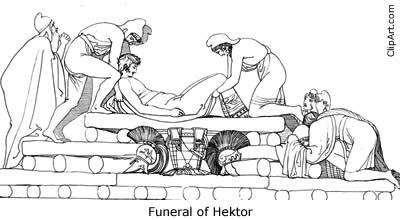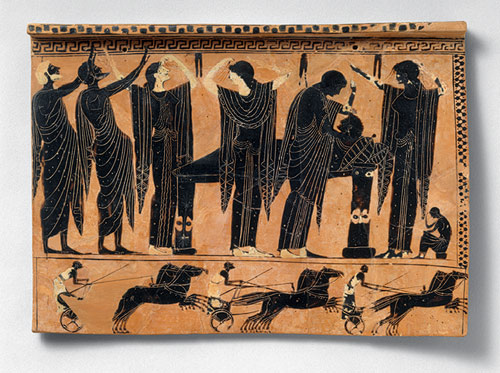Ancient Greeks are known for many things: their poems, their plays, their mythology, their philosophers and the Olympics. Some things that aren’t as well known include their burial practices. Ancient Greeks believed in gods and the afterlife, funerals were an important aspect of the transition from life to death. So they created proper rituals that would enable the body to enter the afterlife peacefully—but if done incorrectly, the body would enter Hades.
The afterlife wasn’t known to be particularly pleasant, and death was feared due to the terror of the underworld and especially of Hades. While the underworld was known for its terror, it was also a place of peace and pleasure for those who had done right in their lives. One particular place is the Elysian Fields—a green, pastured paradise.
While ancient Greeks changed their burial methods often, their main belief was that, through a tiny gust of wind, their spirits (or their psyche) were released from their bodies right as they passed away. It was dire to perform a proper burial, and not having one was insulting to the human pride and a potential sendoff to the dark side of the underworld. The proper burials consisted of three parts: the prothesis, the ekphora, the perideipnon. In the prothesis the remains were laid on a high bier in their home after being washed, oiled, and clothed. The head was supported, so that the jaw would not sag, and the feet always faced the door. The family would try to prevent the psyche from leaving the body by closing the mouth and the eyes. The eyes were topped with two gold coins on each eye, which was believed to be the toll for the ferry to head down the River Styx. During this part, friends and family would come and say goodbye to the body. In the next stage, ekphora, the body was taken to the cemetery just before dawn. On their way to the cemetery, the family would stop and attract attention in order to get professional mourners to walk with them. Arriving at the grave, the body was either buried or cremated. Afterwards, the families would mark the grave with tombs and marble statues, so that their loved one wouldn’t be forgotten. After the ekphora comes the perideipnon, or the funeral party. This would be performed in the home of the deceased. After the funeral, on the third day, ninth day, thirtieth day, and one-year anniversary women would bring small cakes and jewelry to the grave as an offering, hoping it would make the journey a bit easier.
With elaborate traditions and burial practices, the ancient Greeks influenced many different cultures throughout the world. These traditions helped people view death not only as frightening but also beautiful. And while they feared death, the ancient Greeks still created the idea that death is not the end, but the beginning.
More from Cultural Perspectives:
- The Catacombs of Paris: Unique Burial Site of Ancient France
- Oaxaca, Mexico: The Contemporary Zapotec Funeral
- Embracing Death with the Jain Ritual of Santhara

 Ancient Greece’s Burial Traditions
Ancient Greece’s Burial Traditions




 “Help Me, Helen”
“Help Me, Helen”
 Recovering Cremation Remains After the Los Angeles Fires
Recovering Cremation Remains After the Los Angeles Fires
 “As Tears Go By” by Marianne Faithfull
“As Tears Go By” by Marianne Faithfull














